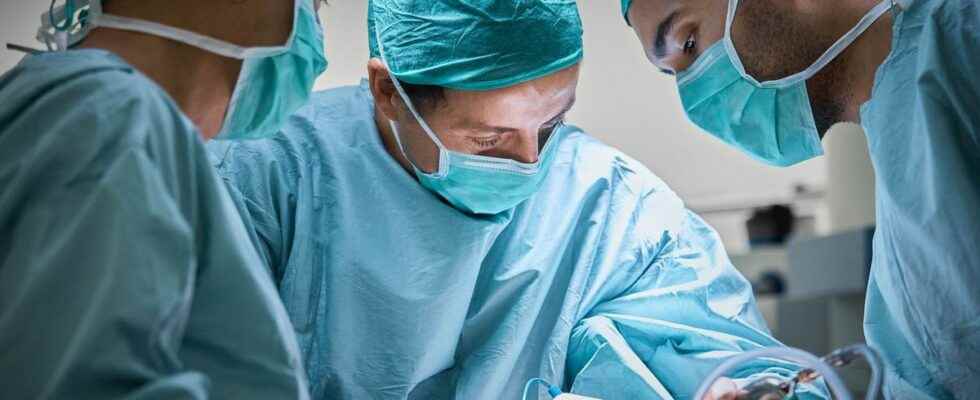Published on
Updated
Reading 3 mins.
On Saturday, September 17, a new uterus transplant took place at the Foch Hospital in France. Although this is the second time this procedure has been performed, it remains a real medical feat and the only hope of pregnancy for some women. The explanations of Dr. Marc Even, gynecological surgeon at the Pointgyn center and at the Foch hospital in Paris.
Womb transplant: a medical feat!
According to the press release from the Foch Hospital of Suresnes in the department of 92 that the exploit took place. The teams of Professor Jean-Marc Ayoubi, head of the obstetrics gynecology and reproductive medicine department of this hospital, carried out a uterine transplant on Saturday September 17, which required almost 18 hours of surgery.
Follow your pregnancy week by week
Mayer-Rokitansky-Küster-Hauser syndrome
The patient who benefited from this uterus transplant has Rokitansky syndrome (or MRKH). It is a rare congenital condition, responsible for infertility by uterine agenesis (birth without a uterus). It was from the uterus of a living donor – his sister – that the surgeons at the Foch Hospital in Suresnes were able to achieve this feat.
“This second uterine transplant in France marks the continuity of a research project started by Professor Ayoubi more than 15 years ago, and of an international collaboration with the team of Professor Mats Branstrum, of the University of Gothenburg (Sweden)”can we read on the press release.
During the uterine transplant, everything went as planned. Ten days later, both patients returned home and are doing well.
A second pregnancy for the first transplant recipient
Still according to the press release from the Foch Hospital in Suresnes, the first transplant took place in March 2019. The first patient was called Déborah. Thanks to this transplant, she gave birth on February 12, 2021, to a baby girl named Misha, after 33 weeks of pregnancy. Déborah has therefore become the first mother of a little girl born from a uterine transplant in France. Today, Déborah is expecting her second child, scheduled for March 2023.
“This medical intervention consolidates hope for patients born without a uterus or presenting uterine infertility caused by a hysterectomy or a non-functional uterus. It has mobilized more than twenty researchers and allows significant scientific advances in the fields of transplantation and reproduction,” concluded the Foch Hospital in Suresnes.
For Déborah, after her second childbirth, the time will come to have her uterus removed. “After two pregnancies, the goal has been achieved. The uterus not being a vital organ, there is no reason for her to keep it and at the same time have to continue to take immunosuppressive treatment to avoid having a graft rejection” details Dr. Even.
WHO ARE UTERUS TRANSPLANTS FOR?
For congenital reasons or following surgical treatments, some women do not have a uterus, which prevents them from having a child. For them, the possibility of benefiting from a uterus transplant could represent hope.
- The absence of a uterus can be of congenital origin. This disease known as MRKH syndrome (for Mayer-Rokitansky-Küster-Hauser syndrome) affects one in 4,500 women. It is characterized by the absence of the uterus and the upper part (2/3) of the vagina. It can be isolated but is most commonly associated with abnormalities in the kidneys, spine, and to a lesser extent hearing and heart problems. The first sign is the absence of periods in young women who otherwise have normally developed secondary sexual characteristics (breasts, etc.). The genetic origin of this syndrome remains partly mysterious. The treatment consists in reconstituting a new vagina in order to allow a normal sexual life… but does not allow to have a child apart from adoption or surrogacy, prohibited in France.
- Finally, the removal of the uterus (hysterectomy) can result from surgical treatment for endometrial cancer, fibroids, prolapse, endometriosis, etc.
Professor Ayoubi’s team has received authorization from the Biomedicine Agency and the National Agency for the Safety of Medicines and Health Products (ANSM) to conduct a clinical trial for ten transplants with living donors with a link relationship with the recipient. A team from the Limoges University Hospital has obtained approval for eight brain-dead donor transplants. Due to the shortage of living donors and the risk to living donors, this new technique could help more women to have a child.
So what does this second transplant tell us? For Dr. Even, “it’s a successful transplant, the patient and her sister are doing well. For the recipient, it will then be a question of attempting an embryo transfer in 6 months or a year if all goes well“.
